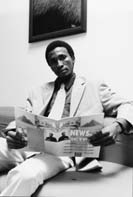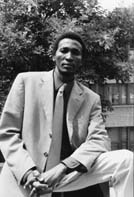Personal tools
News from ICTP 97 - Profile

Arbab Ibrahim Arbab, assistant professor of physics at Omdurman Ahlia University in Sudan, was a student in ICTP's first Diploma Course. His road to success began in Trieste.
Sudan Success

The year 1990 was not a good
year for Arbab Ibrahim Arbab. Although he had graduated
with a bachelor's degree from the University of Khartoum in his
native Sudan a year before, he had spent much of his time since
then in search of secure employment--first in the Department of
Physics at his alma mater, where he had hoped to teach
while earning a master's degree, and then in Libya, where he taught
high school physics part-time.
"I wanted to stay in Sudan to continue my education. While
the University of Khartoum had shown some promise in the 1970s
and 1980s, by the time I was ready to begin graduate school almost
all the good people had left. Political uncertainties were making
a difficult situation even worse."
"I was running out of options," Arbab recalls, "when
my former professor at the University of Khartoum, Mohammed Saeed,
suggested that I apply to the newly created Diploma Course at
ICTP in Trieste, Italy. I didn't know anything about ICTP but
Saeed was a frequent visitor to the Centre and he assured me that
it would be a good place for me to be."
Arbab was accepted and, with 21 other young students from the
developing world, he became a member of the inaugural class of
the Diploma Course.
Arbab's first few months as a Diploma Course student were not
easy. "The courses not only proved difficult in content,"
he explains, "but they required me to think and learn in
entirely new ways. Previously I could excel by simply memorising
information. Now I had to solve problems. I'll never forget that
one of the first examinations in the Diploma Course was an open
book test. That surprised me because having the text book in front
of my eyes made me think I could look up the answers. Nothing
could have been farther from the truth."
Arbab also credits the Diploma Course with teaching him how to
teach. He notes that for the first time in his life, he was "required
to make oral presentations and to defend his arguments before
his peers," helping him acquire the organisational skills
and gain the confidence that he needed to be a good teacher.
After adjusting to the rigours of his new environment, Arbab enjoyed
a successful second semester and was among those who received
ICTP's first Diplomas. "It was a proud moment for all of
us. We had come from many different countries and cultures and
had both competed and cooperated throughout the year to attain
our goal. As members of the Centre's first Diploma Course, we
enjoyed both a feeling of individual and collective achievement
that made the moment special." Today some of the Diploma
students with whom he graduated are among Arbab's friends, including
Egyptian-born Shaaban Khalil, who is now a post doc at the University
of Sussex in the UK, and West Indies-born Surujhdeo Seunarine,
who is a post doc at Christchurch University in New Zealand.
Between 1993 and 2000, Arbab earned his Ph.D. in physics at the
University of Khartoum, where he also taught undergraduate students
first as a lecturer and then as an assistant professor. Insufficient
resources, large class sizes and poor pay made life as a scientist
difficult. "The department," he says, "lacked both
the size and energy to be a dynamic centre for teaching and research."
Reflecting a problem common to many university physics departments
in Africa, Arbab noted that the next youngest faculty member in
his university was more than 20 years older than him. He also
observes that he had to teach four classes and 200 students each
semester, leaving little time for research.

Things are now looking up for Arbab. Last year, he became an assistant
professor at Omdurman Ahlia University in Sudan, one of the best
institutions of higher education in the country. "The teaching
load is lighter and the facilities are better equipped."
More importantly, he notes, "professors are given a greater
sense of autonomy and are able to devise and pursue their own
research agendas." In Arbab's case that means time to study
and publish in the fields of cosmology and astrophysics with special
attention to questions related to vacuum decaying and fluid repulsion.
Arbab was appointed an ICTP Regular Associate in 2000 and, just
this spring, was named dean at Comboni Computer College in Khartoum.
Recent changes in Sudanese law will allow him to simultaneously
hold both his professorship at Omdurman Ahlia and his administrative
job at Comboni.
All of this means that he will now be able to meld his skills
in research, teaching and administration in ways that professors
in Northern universities take for granted.
There is no better testimony to the success of the ICTP Diploma
Course than Arbab's current good fortune. Much of this has to
do with Arbab's own skills and drive, but much also has to do
with the strong foundation in analysis, research and teaching
that the Diploma Course provided him with a decade ago.